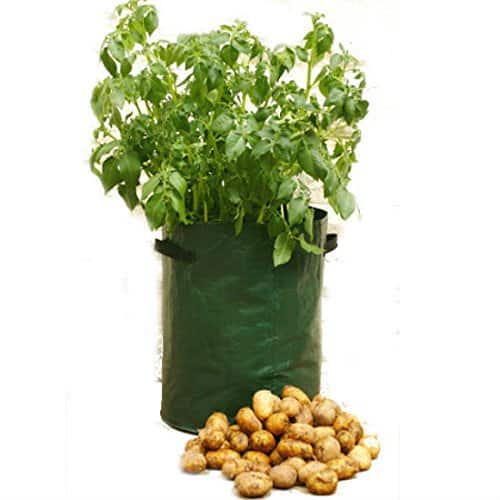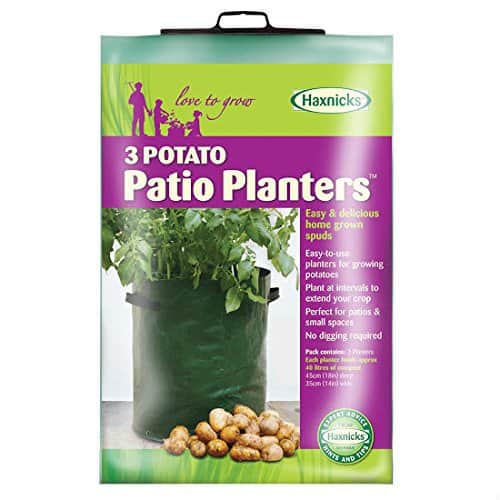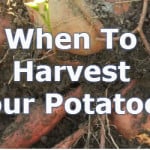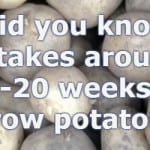Last updated on November 10th, 2021
Our site is reader supported, this means we may earn a small commission from Amazon and other affiliates when you buy through links on our site.
There is nothing better than eating your own home grown potatoes! Gone are the days when you need your own specific patch of garden to be able grow your own. There are now many varieties of seed potatoes that are well suited to growing in potatoes bags. If you want to keep the cost down further they can also easily be grown in pots or even an old compost bag if you prefer. Growing seed potatoes in pots is ideal as you can plant them even if you have a smaller space to grow them in, they can even be grown on a small balcony or terrace.
Whatever the type of container you use, the technique is always the same. There are two ways in which to grow potatoes in pots. The more traditional way is to plant the potatoes and then earth up the potatoes as they grow covering up the new growth. The second way which makes it a little easier is to simply plant the potatoes and cover the potatoes with compost, filling the pot to just under the rim.
When you get your seed potatoes they are usually around the size of an egg. This can often vary, but they should grow just as well whether they are smaller or larger.

Chitting potatoes
There is much debate on whether seed potatoes actually benefit from being chitted before planting, but most gardeners do still recommend this step. The idea is that you are getting them growing before planting them which should result in better yields. Simply put your seed potatoes in egg boxes with the rose end facing up, this is easily identified by the immature shoots which should all be at one end. Place them in a dry, cool, frost-free position until you are ready to plant them. By this time they should have small shoots.
When to plant seed potatoes in pots
You can purchase seed potatoes from around January onwards. Ideally you should be planning to plant first early potatoes from around the end of February to late May, with Second Early and Main Crop varieties between March and May.
The earlier you plant seed potatoes the better. If you plant them earlier then they will need to be grown in a greenhouse or conservatory where they are protected from frost. If you are planning on growing them outside from day one, then you are best waiting until the weather has warmed up and plant them around May.
Planting Christmas Potatoes (also known as second cropping potatoes) – These potatoes are planted in exactly the same way, the only difference being is that they are planted in August and harvested around 11 weeks later just in time for Christmas. These need to be grown under cover to protect them from frost.
Follow our step-by-step and easy-to-follow guide to growing your own potatoes in containers.
Read next: How to grow Christmas potatoes
Growing seed potatoes in pots
- Firstly you will need a potato growing bag or an alternative suitable container, a 20 litre is usually about right but the bigger the better as you can produce bigger yields with more space.
- Next fill the bottom 8 inches of the pot with a good quality compost. We have seen better results by mixing farm manure and compost in a 50/50 ratio.
- Now you are ready to plant your seed potatoes. Evenly space them and cover with a layer of 3-4 inches of compost (or compost and farm manure mixed together). Usually you can put around 4 or 5 seeds potatoes in one pot or grow bag.
The next step will vary depending on how you want to grow them. The easiest (and often just as successful) way is to fill the whole pot with compost and farm manure mixed together to approximately 2 inches below the top.
If you want to grow them the more traditional way, then you cover the potatoes with a few inches of compost and then as the new shoots appear you cover with a few more inches of compost. You repeat this step until the soil level reaches the top of the pot.
Place the plants in a bright sunny spot and watch them grow.
The potato patio planter above is available from Amazon.co.uk – Click to view
Watering and feeding potatoes grown in pots
Simply water well as the soil starts to dry. It has proved better to water them well just as the soil starts to dry rather than watering little and often as the water may not get to the bottom of the pots, this is especially true for grow bags as the tend to be deep. Feed potatoes with a potato fertiliser or a feed high in potash roughly every 2 weeks but check on the packaging first as application directions may vary.
Harvesting potatoes
First early potatoes are usually new potatoes and are lifted when the flowers are open, this is around 10 weeks after planting. It is worth digging down into the pot a little to see if they are ready. If not, leave them another week and check again.
Second early varieties are usually ready around 13 weeks after planting, usually again when the flowers are open. Main crop potatoes take much longer to mature and are usually ready around 20 weeks after planting. Harvest main crop potatoes two weeks after the foliage and stems have started to wither usually turning yellow.
Storing your home grown potatoes
Simply let them dry for a few hours after harvesting and once dry store them in hessian sacks or paper in a cool, dry and frost-free place.
Possible pest and diseases
One of the advantages of growing potatoes in pots is that they are usually not affected by any diseases or pests. Never use garden soil to fill pots as diseases can sometimes be introduced this way and keep an eye out for pests just in case. Slugs are the most common pest, but there are plenty of ways to control them with traps and pellets etc. Ensure that the pellets can be used on edible foods before applying.



